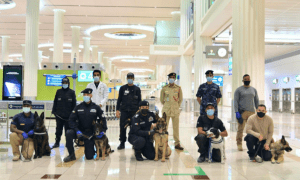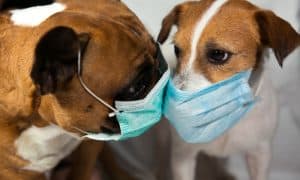“This post contains affiliate links, and I will be compensated if you make a purchase after clicking on my links.”
Leading experts in animal health recently joined forces to provide guidance to veterinary and shelter professionals around the globe on pets and the current pandemic. Brought together by Trupanion, the leader in medical insurance for cats & dogs, the experts spoke on a wide range of topics in response to COVID-19 with the underlying theme that, to date, this is a people-to-people disease and that pet-to-people transmission is unlikely.

“The purpose of this webinar was to bring our community together to align in confronting a global enemy through education and fact-based insight,” said Dr. Steve Weinrauch, BVMS, MRCVS, chief veterinary officer at Trupanion, Founder of MightyVet and webinar moderator. “These forces aligned can achieve great things.”
Michael Lappin, DVM, PhD, DACVIM (SAIM), and Chair of the WSAVA One Health Committee commented that the current situation is changing not just day by day but minute by minute, but for now, this is a human-to-human disease.
“The world opinion right now is there is no evidence that pets can transmit COVID-19 to people,” said Dr. Lappin.
Lappin noted that while more data is needed, the potential fomite transmission should be low. To date, there has been no documented transmission from a dog or cat to a human.
The original inference that pets may be affected by the coronavirus (SARS-CoV-19) causing COVID-19 started when two of 17 dogs in Hong Kong housed with owners with COVID-19 tested positive for the RNA of the virus. One of the dogs ultimately developed serum antibodies suggesting that subclinical infection did occur. None of the eight cats isolated in Hong Kong were positive at the time the webinar was recorded and none of the dogs became clinically ill.
Shortly after the webinar was recorded, a cat with transient vomiting and diarrhea housed with a COVID-19 patient in Belgium tested positive for RNA of the virus. Studies are ongoing to determine whether the cat was infected with the virus or just exposed from sharing the same environment.
Experts in animal welfare and shelter medicine agreed that there is no evidence at this time that pets can transmit COVID-19 to people; yet critical steps must be taken to navigate this unprecedented time.
Related: Quarantined? Here’s How to Exercise and Entertain Your Dog Indoors
“As soon as this pandemic reared its ugly head, leaders came together, they saw the writing on the wall and immediately mobilized,” said Jim Tedford, president and CEO for The Association for Animal Welfare Advancement (AAWA). “Working together we have come up with global strategies that would work for any animal sheltering organization, anywhere.”
Shelter medicine expert, Dr. Julie Levy, also pointed to five critical steps that shelters should be taking as they navigate this unprecedented time, including the need to preserve a shelter’s critical functions.
“Animal shelters and animal control officers are first responders to meeting societal needs,” said Dr. Levy, DVM, PhD, DACVIM, DABVP, Fran Marino Endowed Professor of Shelter Medicine Education at the University of Florida. “It’s imperative that we reinforce with policy makers and elected officials that animal shelters, animal control officers, and veterinary clinics are essential services that need to have the opportunity to stay open when shutdowns occur. However, these organizations should suspend non-emergency activity to support public health initiatives calling for the public and personnel to stay at home.”
The webinar, co-hosted by Covetrus, was free and RACE approved for veterinary professionals. More than 10,000 animal health professionals have viewed or registered for the webinar in under 72 hours. To view a playback of the webinar on Facebook visit MightyVet or Not One More Vet.
A second webinar to discuss additional information and updates to any new developments will take place the week of March 30, 2020.


















